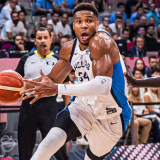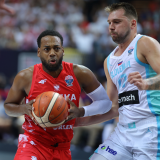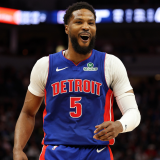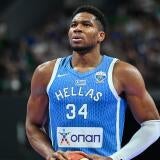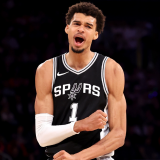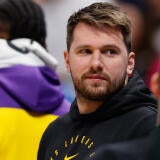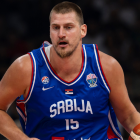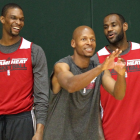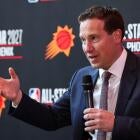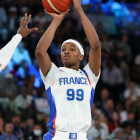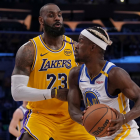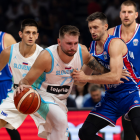Micah Parsons trade vs. Luka Dončić blockbuster: Which Dallas deal debacle was worse?
Dallas has traded away two of the best young athletes in the world in a seven-month span
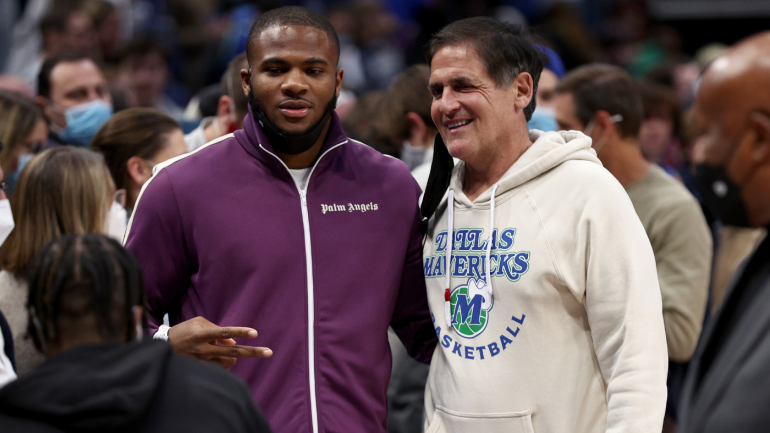
The Micah Parsons trade that sent shockwaves through the NFL on Thursday evening felt eerily similar. A Dallas sports team trading a superstar in his mid-20s for a middling return with a major payday looming? That's the Luka Dončić trade somehow replicated in less than a year. Dončić is perhaps the best offensive player in basketball. Parsons is perhaps the best defensive player in football. Arguably neither has yet reached his prime. And the same city has somehow willingly given both away in a seven-month span.
We can't yet say for certain how Dončić and Parsons will do in their new homes, though the early returns are positive. Both have since inked contract extensions with their new teams. FanDuel Sportsbook has the Green Bay Packers tied for this season's fifth-best Super Bowl odds at +1200. Vegas isn't quite as bullish on the 2025-26 Los Angeles Lakers, but they're treating this as a transitional season. The idea in Tinseltown will be to use Dončić as a recruiter to land a young superstar to eventually replace LeBron James and lead the next great era of Laker basketball. Arguably the most successful teams in NBA and NFL history just refueled at the same gas station.
But success for the Lakers and Packers is, historically speaking, practically a given. The real question here is how the city of Dallas picks up the pieces. Both the Cowboys and Mavericks left their blockbuster trades in similarly precarious positions. And so, with two potential local icons shipped out prematurely, let's attempt to figure out which Dallas team will regret its blockbuster deal more in the long run.
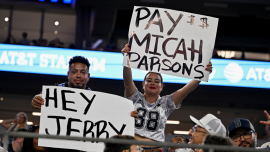
The case for the Dončić trade
Let's start with the obvious: a star in the NBA is capable of impacting a game far more than a star in the NFL. At best, any NFL player not named Travis Hunter Jr. is going to be on the field a bit less than half of the time. For his career, Dončić has averaged 34.9 minutes played per game. That means he's on the floor roughly 73% of the time in a 48-minute game, and he's on the field with only four teammates, as basketball allows for five players at a time. Football allows for 11. And remember, Dončić can control the ball on virtually every possession for the Mavericks offensively. Parsons is not a quarterback. He simply is not capable of exerting the same degree of influence over a football game that Dončić can over a basketball game.
There is also team-wide track record to consider here. Parsons has won only a single playoff game, and the Cowboys missed the 2025 playoffs. That's through no fault of his own, but it would be hard to suggest that the Cowboys were closing an immediate championship window by trading Parsons. The Mavericks were the defending Western Conference champions when they traded Dončić.
Though they dealt with injuries throughout the early portion of the 2024-25 campaign, it should be noted that they were the team that knocked out the eventual 2025 champion Oklahoma City Thunder in the 2024 postseason. The Thunder are the presumed championship favorites for the next several years at least. The Mavericks had the single player in all of basketball that most vexed them. Over the past two seasons, the Thunder are 5-6 against Dončić-led teams and 143-45 against everybody else. Now, the Mavericks have to compete against the Thunder without Oklahoma City's kryptonite.
That's the next stage of devastation for Dallas. The Mavericks didn't trade Dončić for a future-focused package of assets. It was a win-now trade that made them worse in both the present and the future. Yes, Anthony Davis remains a very effective player, but he turned 32 a month after the trade and has a well-known injury history. Since the Orlando bubble, he has played in 259 of a possible 400 regular-season games. Kenny Clark, the player the Cowboys got back for Parsons, is 29 and hasn't missed a game in three years.
Nico Harrison's win-now vision was based on the partnership between Davis and Kyrie Irving, but a torn ACL from Irving dashed those dreams in the short-term rather quickly. Irving may play in the 2025-26 season. He may not. Either way, he will turn 34 this season and the Mavericks just gave him a three-year contract. They are stuck with a lot of risky money on their books. The Cowboys mitigated the risk that would have come with a long-term Parsons extension.
Money isn't the only risk here. As safe a bet as Parsons looks on paper, the NFL is not the NBA. Star trades in the NBA are almost always wins for the acquiring team. Think of the seven champions we've had in the past seven years. More than half of them -- the 2019 Raptors (Kawhi Leonard), the 2020 Lakers (Anthony Davis), the 2021 Bucks (Jrue Holiday) and the 2024 Celtics (also Holiday) -- won it all immediately following a star trade. It's a matter of supply and demand. Having multiple superstars is a prerequisite for winning in the NBA. The supply of star-level talent is minimal. Therefore, demand is through the roof, and almost any price paid is worthwhile. There are certainly examples of the opposite. The Thunder stand out here. Their championship was built on the Clippers overpaying for Paul George. But the Mavericks didn't get Shai Gilgeous-Alexander and five first-round picks in their deal. They were simply on the end of their trade that more often loses without having received the sort of outlier package it takes to justify such a move.
But building a Super Bowl winner in the NFL is much more complicated. Top-level talent is obviously a necessity, but rosters are so much deeper and individual players are so much less important that teams have a lot more leeway in how exactly they construct their teams. Every NBA champion has a star-level lead ball-handler like Dončić. Not every Super Bowl champion has a star-level pass-rusher like Parsons.
In fact, when you look at the recent history of trades of this magnitude in the NFL, the teams giving up the stars have typically done better. In the past decade, seven players have been traded for at least two first-round picks. The Deshaun Watson and Russell Wilson trades were unmitigated disasters for their teams. Jamal Adams made only a single Pro Bowl as a Seahawk and was released after four years and just 34 games played. Khalil Mack and Laremy Tunsil played well enough to justify the prices paid, but their teams never reached a conference championship game with them.
Of those seven trades, the only two that could be qualified as absolute successes were the two made by the Rams for Matthew Stafford and Jalen Ramsey. Los Angeles won a Super Bowl with the two of them. But look at the returns Detroit and Jacksonville got back in their respective trades. The Lions turned the Stafford picks into Jahmyr Gibbs, Sam LaPorta, Jameson Williams and others, and they also got Jared Goff in the deal. The Jaguars did far worse, taking K'Lavon Chaisson and Travis Etienne with the picks they received. However, that had less to do with the value of their return and more to do with their own poor drafting. In 2020, Justin Jefferson, Brandon Aiyuk, Jordan Love and Patrick Queen were drafted with in 10 slots of Chaisson. The NFL is so random when it comes to injuries and aging curves that star trades have often been escape hatches for teams with expensive players. The team giving away the star wins these trades far more often than they do in the NBA.
The Cowboys know this from experience. Their 1990s dynasty was built on a trade very similar to the one that brought Gilgeous-Alexander to Oklahoma City: the Herschel Walker trade. The Cowboys got a historic haul of picks in that deal. The Vikings got three fairly average years of running back production out of Walker. They obviously didn't replicate the return from the Walker deal when giving up Parsons, but giving up Walker-esque players in the NFL is by and large a better strategy than giving up Dončić-esque players in the NBA. Parsons obviously falls in the former camp.
This is part of the nature of football itself. It's a physical game. Players drop off earlier and with less notice. Parsons and Dončić may be the same age at 26, but NBA stars regularly maintain their performance deep into their 30s. That's far rarer in the NFL, at least where non-quarterbacks are concerned. One could argue that Parsons is better at his job than Dončić, but it's hard to imagine he'll do it longer. The Mavericks almost certainly lost out on more Dončić greatness than the Cowboys did with Parsons.
The case for the Parsons trade
We'll start with the obvious: the NFL doesn't have a lottery. The Mavericks and Cowboys both left their trades as, seemingly, below-average teams. The Mavericks finished the 2024 season with the 11th-worst record in the NBA. Right now, FanDuel Sportsbook odds suggest that Dallas is slightly likelier to win less than 7.5 games (-135) than they are to go over that total (+115) in 2025. The only team to win exactly seven games last season was the Cowboys, who picked at No. 12. The No. 12 pick obviously can lead to superstars. Dallas got Parsons in that slot, after all. But it's obviously not a sure thing. No NFL Draft slot is. Even the best quarterbacks miss as often as they hit.
But top NBA picks are far safer, and thanks to the lottery, the Mavericks jumped from No. 11 to No. 1 and selected Cooper Flagg. History suggests Flagg is almost certain to be an All-Star. After all, every No. 1 overall pick between 2008 and 2023 except for Anthony Bennett, Markelle Fultz and Deandre Ayton made at least one All-Star Team.
Flagg was not directly acquired in the Dončić trade, but Dončić was functionally responsible for Flagg landing in Dallas. Had Dallas kept Dončić, the Mavericks likely would have made the playoffs, and therefore wouldn't have been able to jump up in the lottery. Davis, Max Christie and a 2029 first-round pick from the Lakers is not a reasonable return for Dončić. But Davis, Max Christie, a 2029 first-round pick and Flagg in exchange for Dončić and a mid-first-round pick, which was what the trade turned into in practical terms for the Mavericks, is much closer to fair. As we've covered, a single player is substantially more impactful in basketball than football, so that means that if Flagg is the player we think he is, he might eventually be able to grow into a Dončić replacement.
But the Cowboys probably aren't going to be able to stumble into a Parsons replacement. If they win roughly seven games as Vegas expects, they're once again looking at a mid-first-round pick without the upside potential the NBA Draft lottery offers. In truth, most NFL teams in this situation would be better off winning two or three games. At least then the Parsons trade could functionally lead to a draft pick that becomes a franchise quarterback on a rookie contract.
Except the Cowboys already have a highly paid quarterback. Dak Prescott is earning roughly 18% of the salary cap this season, a figure that's going to jump in 2026 and 2027 before Dallas gets its first potential out in 2028, according to Spotrac. Moving off of Prescott would be so expensive from a cap perspective that the potential benefits of drafting a new quarterback would be limited. Besides, the most highly regarded quarterback in this year's class, Arch Manning, isn't a lock to enter the draft anyway. If Manning stays in college, the price Dallas could fetch by trading the No. 1 overall pick would also be limited. It would still be a premium asset, but no matter how you slice it, the Cowboys are almost certain to benefit less from Parsons' absence in upcoming drafts than the Mavericks did by Dončić's. There's no obvious replacement coming for the Cowboys.
That's part of what makes this trade such a puzzler for them. The Mavericks at least got a premium asset in Davis back in the deal. Their "defense wins championships" plan was a bad plan, but it was still a plan of some sort. Davis, for all of his durability woes, is still a superstar when he's healthy.
Kenny Clark, the defensive tackle heading to the Cowboys, probably isn't. He missed the Pro Bowl last year after making it in three of the previous five seasons. He had only five QB hits in 17 games -- his fewest since his rookie season. He had only four tackles for loss and one sack, both his lowest marks since 2020, a season in which he played just 13 games. It's possible that he just had a down year, but nose tackles aren't known for graceful aging. Only four defensive tackles have earned Pro Bowl nods in their 30s this decade. Aaron Donald is headed to Canton. Chris Jones, Fletcher Cox and Cam Heyward all have cases to join him there. Clark is less accomplished than any of them. He may help a miserable Dallas rushing defense, but he's not fixing it singlehandedly, nor will he come close to matching Parsons' value as a pass-rusher.
Two first-round picks sounds decent on paper, but typically, teams trading away two first-round picks for a veteran are teams that don't expect those picks to be very high. There are obvious exceptions, of course. The Seahawks both gave away a top-10 pick in the Adams trade (which turned into Garrett Wilson) and received one in the Wilson trade (which turned into Charles Cross). Teams can be wrong about their own potential. But typically, these are contenders trading away multiple first-rounders, so their picks are going to be relatively low.
The Packers haven't picked in the top 10 since 2009. This is not a franchise whose draft picks you should ever be all that eager to own. Only the Eagles have shorter odds to win the NFC this season, and remember, the Packers still the NFL's youngest team. Their trajectory is pointing up, not down. The NFL is such an inherently chaotic league that injuries or luck could hold them back, but in all likelihood, these are picks in the 20s. You can obviously find great players in the 20s, but it's harder to do it at premium positions like pass-rusher. Players with physical tools like Parsons' rarely slip out of the top half of the first round.
Again, you can argue with the wisdom of trading for a player like Davis under the specific circumstances that the Mavericks did it... but he is still a superstar player, at least for the moment, and even if they determine that their best course would be to rebuild around Flagg (which they absolutely should), they can still trade Davis for a haul in return. What would the Cowboys get by dangling Kenny Clark? A mid-round pick? Jerry Jones has indicated that the Cowboys could look to flip some of this draft capital for win-now talent, but players like Parsons simply don't hit the trade market, and when they do, they go for more than the Cowboys got in exchange for him. Those late first-round picks will only go so far on the trade market. Whatever they get back, it won't be Parsons.
Frankly, you could argue that even Dončić isn't Parsons. The Mavericks traded Dončić because they believed he had a fatal flaw: his defense, which was the result of what they believed to be poor conditioning. You can dispute that logic, but it at least exists. The Mavericks made the trade for a basketball reason even if it was a bad basketball reason. Even if Parsons is on the field less than Dončić by virtue of playing a different sport, he is far closer to a flawless player at his position than Dončić. The Cowboys didn't trade Parsons because they believed he was overrated. They traded him over a contract dispute that spiraled out of control.
And that brings us to our final point here: the people who made the trades. Nico Harrison is a bad general manager... but he's a general manager. Mavericks ownership can fire him at any time. Eventually, Patrick Dumont is probably going to see the light and replace him. It might take a few years. Harrison's plan might need to fail first. But the person who made the trade isn't the person who's truly in charge of the team. He can be replaced.
Jerry Jones can't. He owns the team. He will presumably run it for the rest of his life. The Cowboys haven't made the NFC Championship Game since the 1995 season. We're now three decades removed from their last final four appearance, and Jones has been running the team throughout all of it. Sadly, questionable moves like the Parsons trade are just the norm for the Cowboys. No one will ultimately be held accountable if this trade fails.
The verdict
I entered this exercise convinced the answer was Dončić, though in fairness, I cover the NBA full-time and haven't written extensively about the NFL in years. The deeper I dove into the Parsons trade, the closer I came to changing my mind. In the end, though, I just couldn't be swayed fully. I believe the Dončić trade to be the worse of the two, though by a smaller margin than I expected.
Here's why: the Cowboys are operating at an asset surplus in a league with extreme parity, and the Mavericks are operating at an asset deficit in a league with fairly limited parity.
What do I mean by that? Well, even if the Cowboys took an enormous step back with the Parsons trade, the NFL is a league in which well-run teams can turn things around very quickly. It's a league that routinely welcomes several new playoff teams per year, and thanks to the single-elimination playoff format, just making it into the tournament gives anyone a somewhat plausible chance of winning it all.
The Cowboys, despite the Parsons trade, have the tools necessary to get back to that level. They still have a viable quarterback. They have another non-quarterback superstar in CeeDee Lamb. They have extra draft picks. They have all of the money they would have spent on Parsons had they re-signed him. Trying to replace arguably the best defensive player in football in the aggregate isn't a wise strategy, but it's reasonably plausible by the nature of the sport. An NFL team has 22 starters. There are a lot of different ways to be good. The Cowboys have the means to find one.
The path to success in the NBA is much narrower. It requires much more discipline and therefore punishes erratic decision-making much more. The Mavericks spent years building a team suited to Dončić's specific strengths. They were rewarded for that with a trip to the 2024 NBA Finals.
But when they traded him, they didn't suddenly get everything they gave up to build that team back. They don't control any of their first-round picks between 2027 and 2030. That's going to make rebuilding around the younger Flagg's timeline substantially more difficult. They've yet to flip their abundance of centers and forwards for the guards they're going to need to run a functional offense when Irving returns from his injury, and they seemingly have intention of doing so. The NBA is not the NFL. There are only five starters. Balance among them is delicate and necessary. The Mavericks don't have it and they don't seem interested in finding it. And the NBA is much less upset-friendly than the NFL. Just making the playoffs means little when you have to beat the best teams four times out of seven. The cream by and large rises to the top.
The Cowboys were a middle-of-the-pack team with Parsons. They're a worse middle-of-the-pack team without him. They still have one of the NFL's better offenses. If they draft well and perhaps make a savvy trade or two, they could absolutely get the defense back up to speed in the next year or two before the offense falls off. Is that likely? Probably not. But the NFL is pretty forgiving when it comes to individual mistakes.
The Mavericks were an undeniable contender with Dončić. They are emphatically not a contender without him. And it's not as though these were short-term labels. Having Dončić may well have led to a decade of contention if the roster around him had been managed correctly. Football players tend to have shorter shelf lives. Parsons almost certainly will age out of stardom before Dončić does. And their future without him just looks far bleaker.
They'll play most of this season without Irving because of his injury. They'll get him back late in the season or the following year, when he and Davis have likely declined due to age and health. They won't be championship contenders at that point, and moving those players for significant value, given their high cap figures, their ages and the NBA's aprons, will be pretty difficult. And that will leave them without the means to rebuild around Flagg because they spent all of their draft capital building a team around a player they no longer have. You can replace a pass-rusher with an inferior player at his position and an upgrade elsewhere. You can't replace a ball-handler in the NBA in the same way. Dončić is practically a top-five offense. Having him guarantees a degree of offensive success that no football player, even a quarterback, can replicate.
That reality is what pushed the Dončić trade over the top. It was not only the worst trade in recent NBA history, but also the worst one the city of Dallas experienced in 2025 even if it faced stiffer competition for that distinction than we expected in February.


